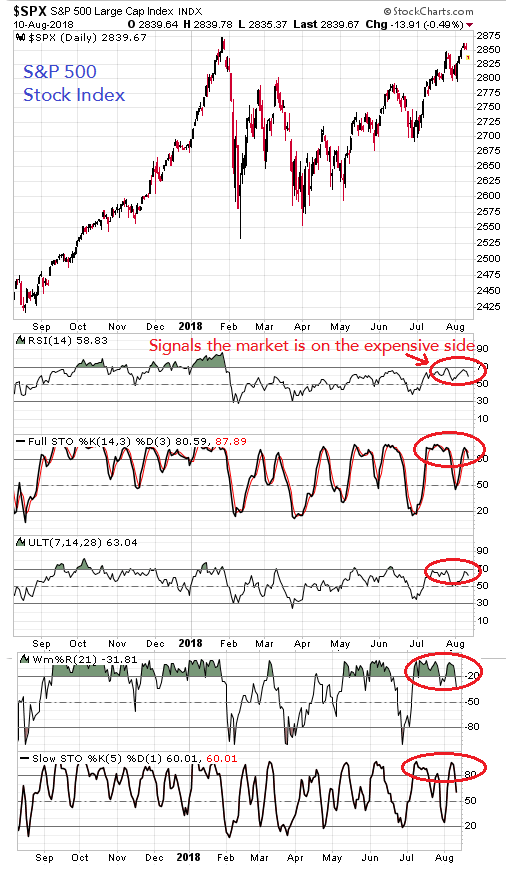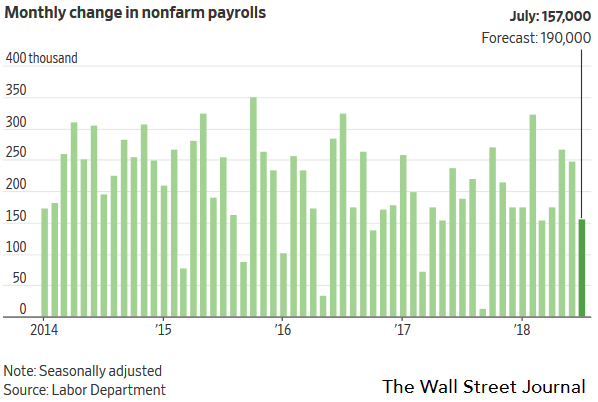A quiet week of trading saw stocks end firmly in positive territory. Through the Friday close, the Dow was higher by 0.5%, the S&P rose 0.9%, and the Nasdaq was up a solid 1.7%. Bond prices rose as their yields moved lower. Gold turned in a solid week, climbing 3.0%. Oil was up, too, gaining 4.0% to $68.52 per barrel. The international Brent oil closed up to $75.43.
Stocks traded in a relatively tight range for most of the week on very light trading. In fact, Wednesday had the least amount of trades we’ve seen all year. Despite the light trading, several stock indexes hit record highs this week.
Not only did stocks hit record highs, but the S&P 500 also marked its longest bull market in history.
Not only did stocks hit record highs, but the S&P 500 also marked its longest bull market in history.
It has been 3,455 days since the S&P bottomed during the financial crisis. In nearly 10 years, the index has not seen a decline of more than 20%, making it the longest bull market in history.
That fact has many worried this rally is getting long in the tooth and due for a correction. While it’s true this is the longest stretch without a 20% correction, we did see a drop of 19% in 2011 and 15% in 2015, so maybe the rally isn’t as long in the tooth as it seems.
That fact has many worried this rally is getting long in the tooth and due for a correction. While it’s true this is the longest stretch without a 20% correction, we did see a drop of 19% in 2011 and 15% in 2015, so maybe the rally isn’t as long in the tooth as it seems.
Part of the reason for the rise in stocks recently has been the solid economy. Last week we mentioned the head of Wal-Mart calling this the best economy he’s seen in 20 years. This week the head of Target essentially saying the same thing as the company reported its best results in over a decade.
It wasn’t all good news this week, though. Markets saw some volatility after news broke on President Trump’s former lawyer pleading guilty to criminal charges and former campaign manager was found guilty of fraud.
Also, trade was in the news as the U.S. and China held mid-level talks on remedying the trade conflict. However, it looks like very little came of the meeting and the two sides both enacted $16 billion in tariffs on goods entering their country.
Also, trade was in the news as the U.S. and China held mid-level talks on remedying the trade conflict. However, it looks like very little came of the meeting and the two sides both enacted $16 billion in tariffs on goods entering their country.
Economic data this week was light, but also on the disappointing side. Housing sales are continuing to slow and durable goods – which are items with a longer life – were also lower.
While economic data as a whole has been positive recently, many reports have come in below expectations. Stock prices are driven by expectations – they are forward looking – so if something comes in below expectations, stocks often decline.
We can see these expectations in the Citi Economic Surprise Index, which we’ve often mentioned in the past. This index tracks how economic data is faring relative to expectations. The index rises when economic data is better than economist expectations and falls on the opposite. It is also fairly correlated to the stock market.
As you can see in the chart below, the index has moved lower while the stock market has not. This doesn’t mean stocks are going to fall now, but maybe a little caution is warranted.
While economic data as a whole has been positive recently, many reports have come in below expectations. Stock prices are driven by expectations – they are forward looking – so if something comes in below expectations, stocks often decline.
We can see these expectations in the Citi Economic Surprise Index, which we’ve often mentioned in the past. This index tracks how economic data is faring relative to expectations. The index rises when economic data is better than economist expectations and falls on the opposite. It is also fairly correlated to the stock market.
As you can see in the chart below, the index has moved lower while the stock market has not. This doesn’t mean stocks are going to fall now, but maybe a little caution is warranted.
Lastly, the Fed was in the news this week.
First, the minutes from their latest meeting were released and they indicated the Fed was likely to pull back on their stimulus program next month by raising interest rates. The odds of that rate hike now stand above 90%.
First, the minutes from their latest meeting were released and they indicated the Fed was likely to pull back on their stimulus program next month by raising interest rates. The odds of that rate hike now stand above 90%.
The Fed also held its annual Jackson Hole symposium, where central bankers from around the world gather to discuss economic conditions and policy.
In the past, major new policies have been announced at this meeting and investors were anxious to see if that would be the case this year. In the end, we didn’t really hear anything new and markets had little reaction to the speeches.
Next Week
Next week again looks pretty similar to this one – corporate earnings are dwindling and there won’t be a lot of economic data. For that economic data, we’ll get info on housing and personal income and spending.
A Nafta deal with Mexico could be possible next week, too. The two sides are reportedly close to an agreement and a deal here is likely to give stocks a boost.
Investment Strategy
No change here. The broader market appears neither cheap nor expensive in the short term at this level. We aren’t actively buying the market here, but aren’t selling either. There are a handful of individual stocks that appear to be on the cheap side, though.
There is no change in our longer term forecast, which remains difficult to predict. Fundamentals are still very good with pro-business policies out of Washington providing a solid tailwind. However, rising interest rates have historically pulled markets lower. It’s tough to say where we think the market will go the long run.
Bonds are also volatile at this time. Yields have risen recently (and prices have fallen), but we don’t think prices will fall much further and continue to trade in the range they have been in for the last several months.
As for the rest of the portfolio, bonds to protect against inflation, or TIPs, remain a good long term hedge for inflation. Floating-rate bonds will do well if interest rates do rise.
Some municipal bonds look attractive for the right client, too. We like buying individual, insured names for these bonds, avoiding muni index bonds if possible. We keep a longer term focus with these investments.
Gold is another good hedge for the portfolio. It is only a hedge at this point – rising on geopolitical issues as a flight to safety.
Finally, in international stocks, we prefer developed markets to emerging ones at this time.
This commentary is for informational purposes and is not investment advice, an indicator of future performance, a solicitation, an offer to buy or sell, or a recommendation for any security. It should not be used as a primary basis for making investment decisions. Consider your own financial circumstances and goals carefully before investing. Past performance cannot guarantee results.
In the past, major new policies have been announced at this meeting and investors were anxious to see if that would be the case this year. In the end, we didn’t really hear anything new and markets had little reaction to the speeches.
Next Week
Next week again looks pretty similar to this one – corporate earnings are dwindling and there won’t be a lot of economic data. For that economic data, we’ll get info on housing and personal income and spending.
A Nafta deal with Mexico could be possible next week, too. The two sides are reportedly close to an agreement and a deal here is likely to give stocks a boost.
Investment Strategy
No change here. The broader market appears neither cheap nor expensive in the short term at this level. We aren’t actively buying the market here, but aren’t selling either. There are a handful of individual stocks that appear to be on the cheap side, though.
There is no change in our longer term forecast, which remains difficult to predict. Fundamentals are still very good with pro-business policies out of Washington providing a solid tailwind. However, rising interest rates have historically pulled markets lower. It’s tough to say where we think the market will go the long run.
Bonds are also volatile at this time. Yields have risen recently (and prices have fallen), but we don’t think prices will fall much further and continue to trade in the range they have been in for the last several months.
As for the rest of the portfolio, bonds to protect against inflation, or TIPs, remain a good long term hedge for inflation. Floating-rate bonds will do well if interest rates do rise.
Some municipal bonds look attractive for the right client, too. We like buying individual, insured names for these bonds, avoiding muni index bonds if possible. We keep a longer term focus with these investments.
Gold is another good hedge for the portfolio. It is only a hedge at this point – rising on geopolitical issues as a flight to safety.
Finally, in international stocks, we prefer developed markets to emerging ones at this time.
This commentary is for informational purposes and is not investment advice, an indicator of future performance, a solicitation, an offer to buy or sell, or a recommendation for any security. It should not be used as a primary basis for making investment decisions. Consider your own financial circumstances and goals carefully before investing. Past performance cannot guarantee results.






























